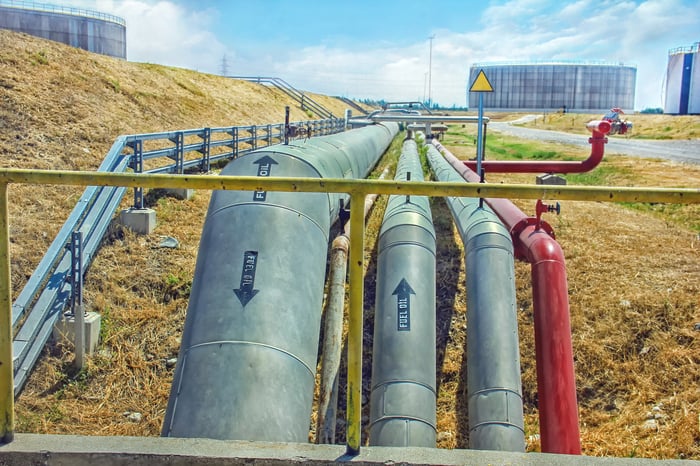TC Energy (TRP 1.16%) has approved the construction of the controversial Keystone XL pipeline project. The Canadian energy company expects to invest $8 billion to build the pipeline, which will transport oil from Western Canada to the U.S. Gulf Coast. The company expects the pipeline to start up by 2023, assuming there aren't any further delays.
Getting the backing it needs
TC Energy has been working toward approving the construction of Keystone XL for several years. It had many hurdles to overcome, including securing the necessary financing for the project. That came from a non-traditional source as TC Energy secured the backing of the Government of Alberta to help fund a portion of the project.

Image source: Getty Images.
The Canadian province has agreed to invest $1.1 billion of equity into the project, which should cover all the planned construction costs through the end of this year. TC Energy will kick in $2.7 billion of equity, which will fund building costs in 2021 and 2022. The remaining $4.2 billion will come in the form of a project level credit facility that the Government of Alberta will guarantee.
TC Energy expects to finance its equity commitment via a combination of retained cash flows after paying its dividend, hybrid securities such as preferred stock, and additional common equity by reactivating its dividend reinvestment program in 2021 and 2022. The company could also issue up to 1 billion Canadian dollars ($700 million) of new stock, if needed, to support its balance sheet. Meanwhile, TC Energy plans to acquire Alberta's equity interest and refinance the credit facility in the public debt markets once the project enters service.
What the project means for Canada and TC Energy
The roughly 1,200-mile pipeline will stretch from an oil storage hub in Hardisty, Alberta to Steele City, Nebraska where it will connect with TC Energy's existing pipeline system. It will have the capacity to transport 830,000 barrels per day (BPD) to refineries along the U.S. Gulf Coast. TC Energy has 20-year contracts in place with shippers for 575,000 BPD of that capacity. They desperately need this pipeline to get their oil to refining and export markets because Canada doesn't currently have enough pipeline space to move its oil output out of the oil sands region. That lack of pipeline capacity has weighed heavily on pricing. Crude in the country recently fell below $5 a barrel due to the COVID-19 outbreak, which is less than the cost of shipping it to a refinery. By increasing the country's export pipeline capacity, it should enable producers to capture market prices in the U.S., which recently were much higher at around $20 a barrel.
Not only is the project an important one for oil producers in Canada, but it's also crucial to TC Energy's growth. The long-term contracts the company secured for the project will provide it with $1.3 billion of annual EBITDA, with additional upside potential if demand exceeds its contracted capacity. The secured agreements alone will deliver a meaningful boost to a company that produced CA$9.4 billion ($6.6 billion) in EBITDA last year. As such, it will give TC Energy plenty of additional fuel to keep growing its 5.6%-yielding dividend, something it has done for the past two decades.
Don't expect a smooth ride
After lots of hard work, TC Energy is finally confident enough to move forward with construction on the Keystone XL Pipeline, thanks in large part to the financial support from Alberta. However, that doesn't mean the project won't run into additional roadblocks that could delay its 2023 in-service date. Because of that, investors will need to keep an eye on this project.
Future delays could weigh on TC Energy's stock price and its ability to grow the dividend. However, if the company can deliver the pipeline on time and on budget, then it will provide a significant earnings boost. That could enable it to produce attractive dividend growth and total returns.





